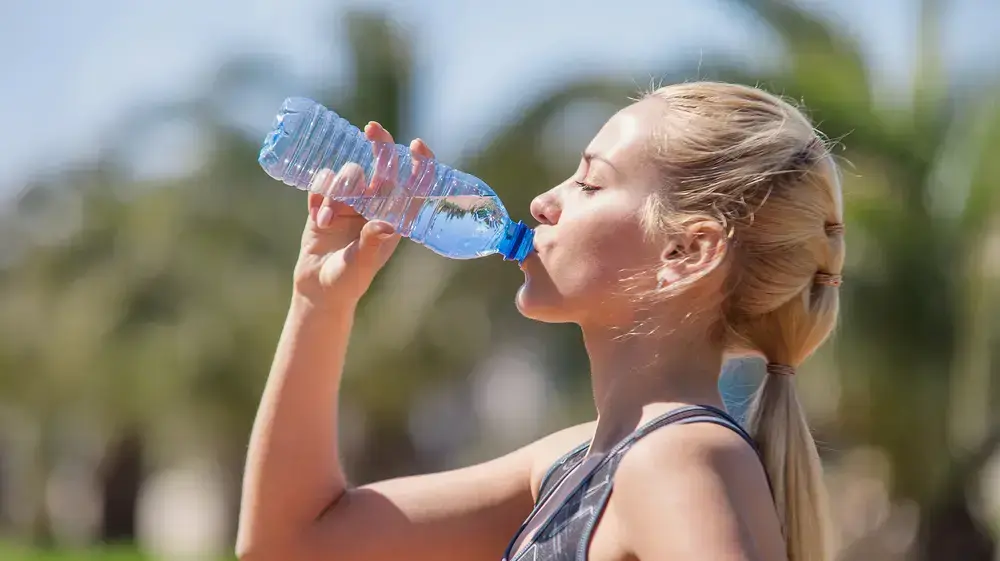health
Nutrition and diet
Preventive nutrition
How many calories and sugar are in one cup of summer fruit?
Watermelon, melon, grapes and pineapple are fruits that give a feeling of lazing by the pool, even if you are stuck in the office.
So that we can pamper them without fear, we examined how they affect our health
Tags
Summer fruits
watermelon
pineapple
Grapes
hotel
Calories
Sugar
Walla!
health
Tuesday, 13 July 2021, 06:09 Updated: 07:08
Share on Facebook
Share on WhatsApp
Share on general
Share on general
Share on Twitter
Share on Email
0 comments
What did they find in the ear of the girl who suffered from a cold?
Bennett: There are vaccines for everyone, we closed with Pfizer Introduction ...
Quaker Yanai Frischer Gutman Liran Kohaner
Who and what dietary fiber
Korean fitness challenge to achieve a flat stomach effortlessly
Leah Schnirer Activia
Dehydration test exercise
teeth brushing
Heat wave in Canada: 130 dead since the start of the wave, heat peak again ...
Bennett in a vaccine complex for teenagers: You can beat the wave ...
Towards the sentence of the Carmel kindergarten teacher from time immemorial: The children's parents ...
Bennett: If the morbidity continues to rise - we will consider returning some ...
How to choose a watermelon?
The complete guide (Walla!) System
Heat, humidity, mosquitoes and children without frames - in the Israeli summer there are plenty of disadvantages, but also one clear advantage - fruit.
Summer fruits are a real treat - refreshing, delicious, accessible and also full of dietary fiber, vitamins and minerals.
Sounds perfect?
Well, as with any health issue - they also have a downside, and that is sugar, of course.
Summer fruits are full of sugar, and calories, so it is better to eat them in moderation.
What is the correct size?
To decide this it is important that you know the nutritional values of the fruits you like.
A cup of watermelon
Also because of lycopene.
A glass of watermelon (Photo: ShutterStock)
Calories: 46 calories
Sugar: 11 grams of
watermelon Although it contains quite a bit of sugar, but it has so many other benefits, that it is really worth eating from, in moderation.
Watermelon is rich in vitamins (vitamin C, vitamin A and B vitamins) and like other red fruits, it also contains lycopene - an antioxidant that helps prevent various types of cancer.
In addition, lycopene benefits with cardiovascular health.
Watermelon is also rich in a substance called citrulline which is of high importance in reducing the chance of high blood pressure, stroke and heart disease.
More on Walla!
Not just water and sugar: why should you eat watermelon?
To the full article
A glass of grapes
Go for the purples.
Grapes (Photo: ShutterStock)
Calories: 69 Calories
Sugar: 18 grams
Grapes also contain quite a lot of sugar, but they also contain vitamins (including vitamin C, vitamin K, thiamine, riboflavin, vitamin B6) and minerals (potassium, manganese, copper).
One cup of grapes contains almost 20 percent of the recommended vitamin K intake and at least 10 percent of copper.
In addition, they also contain natural compounds some of which have been found in studies to have virtues that protect against certain types of cancer.
Such as resveratrol which has been found in numerous studies to be valuable in cancer prevention and treatment.
More on Walla!
List of the cleanest vegetables and fruits, and the ones to watch out for
The question is not just how much fruit you should eat, but what
Attack Yourself: What is comprehensive insurance and when is it critical?
The biggest advantage of grapes is the high content of phenols in them.
Phenols are herbal compounds that have a variety of health effects such as anti-inflammatory effect and antioxidant effect.
These phenols are the reason why several studies have found a link between eating grapes and maintaining high cognitive function, thanks to the fact that they reduce the oxidative damage caused to brain cells.
Their antioxidant capabilities also help reduce the oxidation of bad cholesterol (LDL) and its deposition in the blood vessels, thus reducing the processes of thinning and the chance of heart disease.
And in this context - it is better to eat purple grapes, because they contain powerful antioxidants called anthocyanins, which give the grape its purple color.
A glass of melon
Orange is healthier.
Hotel (Photo: ShutterStock)
Calories: 21 calories
Sugar: 12 grams The
hotel is rich in potassium and also contains vitamins including vitamin C, vitamin B6, folic acid, vitamin K and magnesium.
Its high potassium content helps balance blood pressure and can help people with high blood pressure.
In addition, melon contains about 90 percent water in addition to electrolytes, such as potassium, magnesium, and calcium - so it is the perfect fruit to prevent dehydration in the summer months.
The two types of hotel, green and orange, it is better to choose the orange hotel because it contains high levels of beta carotene and is rich in vitamin C. In fact, an average serving will contain 80 percent of the recommended amount!
A cup of pineapple
A dose of freedom.
Pineapple (Photo: ShutterStock)
Calories: 83 Calories
Sugar: 21 grams
One cup of pineapple cubes contains over 100 percent of the recommended daily intake of Vitamin C. Pineapple is also rich in B vitamins: Vitamin B1 (thiamine), which helps create energy, Vitamin B6 (Pyridoxine), which is essential For the proper functioning of the nervous system, and the formation of red blood cells, vitamin B5 (pantothenic acid) helps to produce energy from food.
And if that's not enough - pineapple contains folic acid, 67 percent of the recommended daily intake of magnesium, manganese, copper, and antioxidants.
Consumption of pineapple helps maintain the integrity of vision and retina.
Studies have shown that it is a protective factor against retinal degeneration, a disease that can cause blindness in old age.
Since it has a high glycemic value, which means that it raises blood sugar quite quickly, and is therefore not recommended for people who suffer from diabetes or pre-diabetes.
Professional advice: Sigalit Paz, clinical dietitian, director of the Center I am allowed to - for proper nutrition, change of habits and weight balance
Share on Facebook
Share on WhatsApp
Share on general
Share on general
Share on Twitter
Share on Email
0 comments






